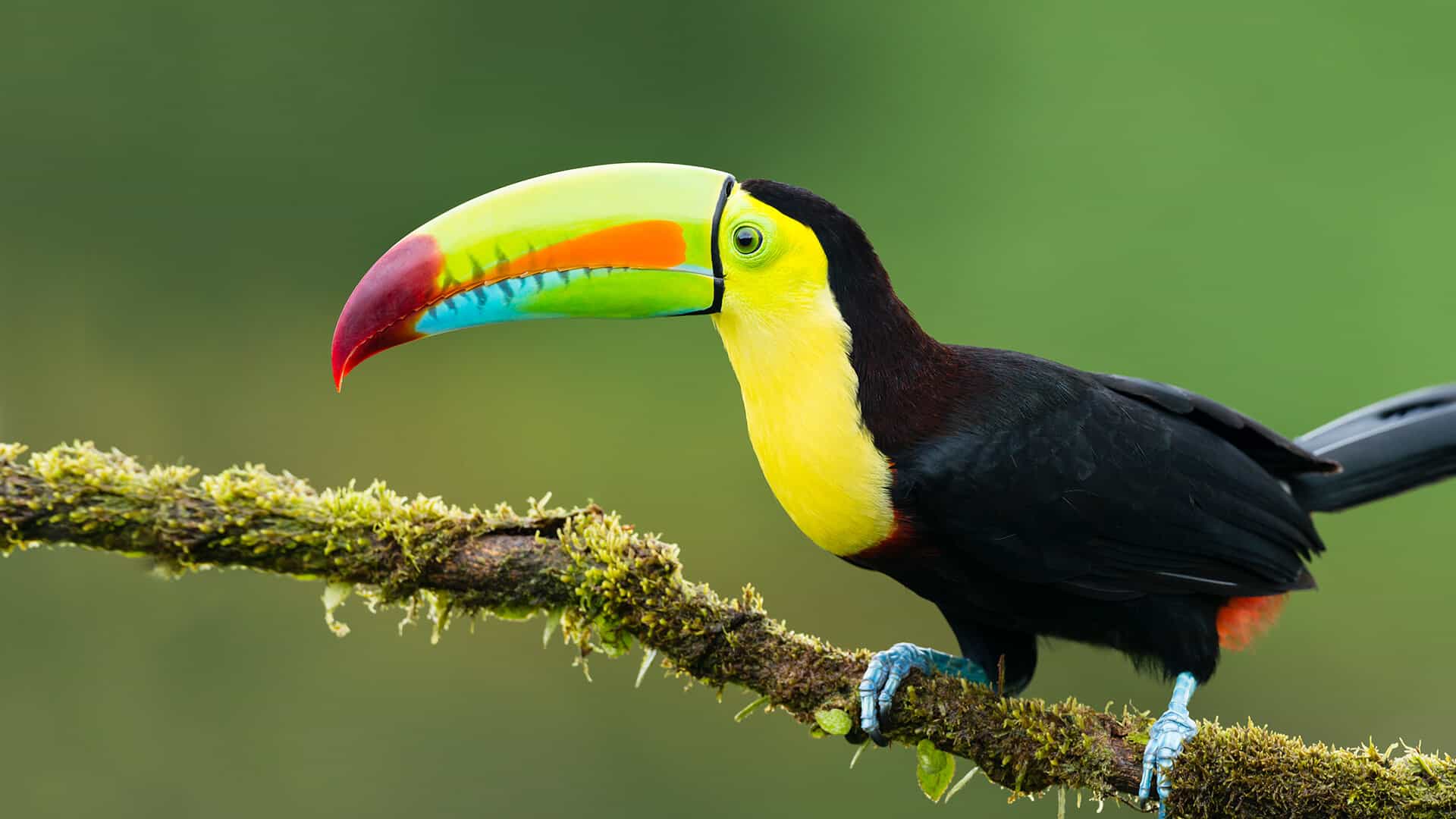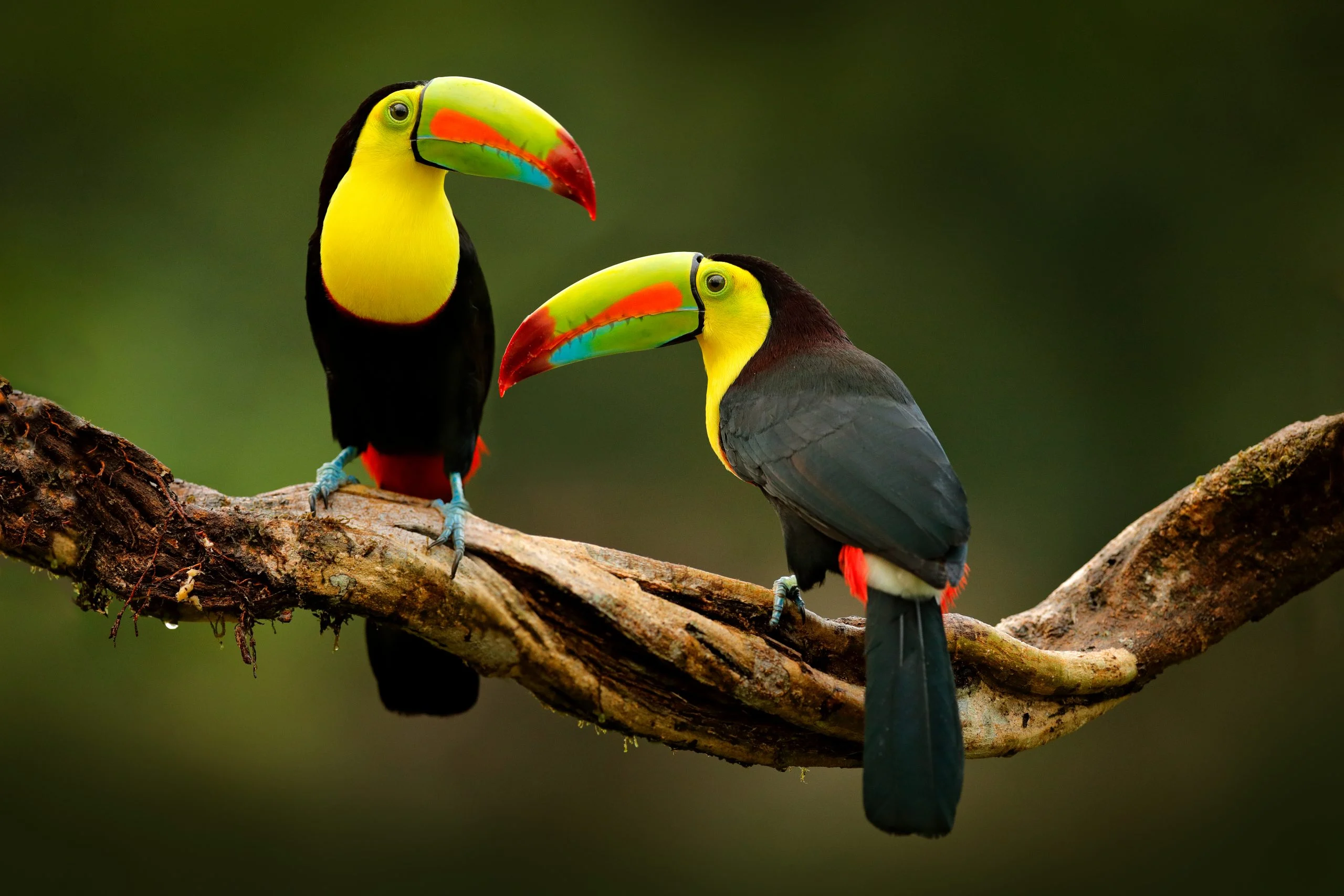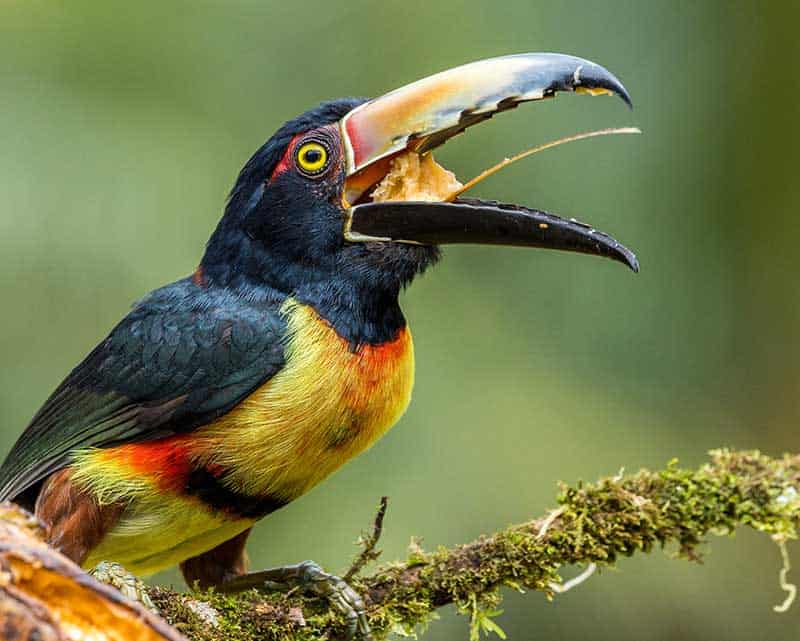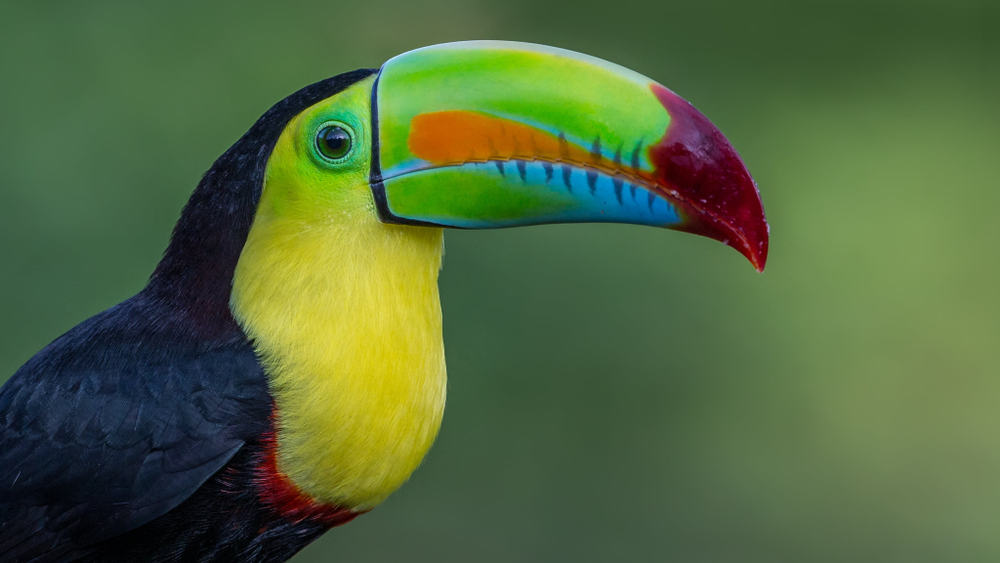When it comes to birds and beautiful beaks, it is impossible to overlook the toucan. Their giant colorful beaks, small body size, and beautiful plumage turned them into one of the most popular bird species around the world.
Now, they are not just popular and beautiful birds; these may be pretty interesting, ideal to play the role of a pleasant and splendid companion to anyone’s eyes. Would you like to know more about toucans? Keep reading.
The Physical Characteristics of Toucans
Toucans are small birds that can grow up to 25 inches, with enormous beaks in comparison to its body, which can be twice their size. These peaks are characterized by bright colors, where reds, greens, oranges, yellows, and more stand out.
These beaks are as prominent as their body, and the width of the body is even greater than that of its head. Each toucan varies in color and size. They are mostly black; however, some toucan species have yellow spots or red and alike.
The size depends on the species. For example, the Toco toucan is the species larger and known among the different kinds of toucans. The Toco toucan has a large beak, weighing almost two pounds and growing up to 25 inches. While the tawny-tufted toucanet is the smallest one in the family of toucans.
The Nature of Toucans
Toucans are birds that tend to jump more than they fly. Their bright colors, rather than just giving them a gorgeous appearance, provide them with good camouflage in the dappled light of the rainforest canopy. These birds have a habit of eating individually or in small flocks.
Their homes are tree cavities, where they nest and lay two to four eggs. This incubation is carried out by both parents, who take turns incubating the toucan egg. These birds can be boisterous, as they maintain vocalizations in the form of grunts and snores to communicate.
Likewise, they do not have their striking beak from birth, as young toucans have to wait for it to grow as they develop; this is a development that takes time.
The Distribution Area, Habitat, and Life Span of Toucans
Toucans are native to the tropical forests of South and Central America, where it is found in their natural habitat. These birds belong to a family established by 40 species, including the Aracari and the toucans.
This tropical bird can live up to between 15 to 20 years, and even though they are lonely birds, they can sleep in a hollow tree with up to five toucans. Some specific places where toucan species are distributed in their natural habitat are Bolivia, Argentina, Paraguay, Uruguay, Guyana, and Surinam.
What Do Toucans Eat?

Every bird species has different diet necessities, and toucans are no exception. These birds, like all animals, need a diet rich in vitamins, minerals, carbohydrates, fats, proteins, and water.
Nevertheless, toucans have a short digestive tract; that is, the transit time of food through the digestive tract is quite fast; which is why toucans eat frequently. How is their diet?
Toucans in Captivity
Toucans in captivity generally have a diet rich in fruits and granular foods with low iron content. Toucans are fruit-loving animals, so they can enjoy a great variety of fruits, such as guava, papaya, mango, watermelon, apples, pears, figs, strawberries, bananas, and melons.
Similarly, in addition to fruits, captive toucans can also enjoy a diet of vegetables and mealworms, and insects such as crickets and larvae.
However, something common in captive toucans is a disease called hemochromatosis; this disease is caused due to excess iron storage. That is why, if you want to have a toucan in captivity, you have to make sure that it has an equilibrated diet in iron and supplements for a healthy diet.
Wild Toucans
Toucans are omnivorous birds, so their diet consists of a wide variety of foods. Their primary foods are fruits and plants, known as their favorite snacks, but this diet must be complemented with insects and invertebrates to give them the needed proteins.
Some of the toucans’ preferred insects are termites, crickets, cicadas, ants, mealworms, spiders, and caterpillars. Furthermore, toucans are opportunistic predators; they can eat little lizards, smaller birds, and eggs.
Baby Toucans
Toucan hatchlings born without feathers and with closed eyes possess an essential diet that includes soft fruits, insects, and arthropods. But most of them only eat white berries that their parents give them, and this is because toucan chicks are born without beaks and do not have teeth, so they cannot ingest food on their own; this is why baby toucans are dependent on what their two parents provide them with, through the regurgitation of food by their parents; this happens until the baby toucans reach youth and are ready to eat solid aliments on their own.
What Not to Feed the Toucans

As toucans have an organism predisposed to hemochromatosis, or iron storage disease (a disorder that causes the body to absorb too much iron from the diet), it should be prevented by providing the toucan with a diet high in iron.
For this reason, be careful not to give your toucan a diet high in sugar, and do not only elaborate its feeding routine with fruits and plants. In this matter, it is also vital that you never give to your toucan fruits high in citrus fruits or veggies like lemons, tomatoes, pineapples, oranges, and grapes, since these amplify iron absorption in your bird’s organism. Also, be sure to use low-iron pellets if you feed them with pellets.
Tips for Feeding Toucans

- Toucans are animals that tend to poop constantly and in large quantities, so sometimes they may even consume feces (you do not want this). For this motive, be sure to clean the plate you use daily to give them food and the container where they drink water.
- You should always offer fresh fruits daily to your toucan. Bananas, melon, kiwi, pitaya, pears, and mangoes are very beneficial fruits for your toucan, so always keep them in their daily diet.
- Monitor the number of fruits ingested every day by your toucan.
- Cut the fruits into small pieces and be sure not to give the seeds to them because if they are ingested, they can cause intestinal problems. Add quality pellets to their diet; make sure to have these available all day long.
- Be careful with the plants you feed your toucan. For example, coffee plants do not do any good, and you should avoid feeding them coffee beans.
- Be sure to remove the fruits that your toucan does not eat, so that when they spoil, they are not ingested by the animal.
- Add small doses of vegetables to your toucan’s diet. Some recommended for them are cucumber, carrots, corn, and pumpkin.
- Before feeding your toucan any commercial food, be sure to check with your veterinarian to make sure it is not harmful to them. Toucans are also prone to parasite attacks, so you should be especially careful about this.
Remember that toucans need proteins (most of them are obtained in nature by eating insects) since they will not have many of them in their cage, it is important that you add some foods full of proteins.
If you can, offer your toucan larvae and caterpillars as a snack. Common animals in their natural diet, but not available in captivity.
In Conclusion
It is not of surprise that toucans are one of the best-known and most splendorous birds in the world; their beauty is undeniable, and their characteristic peak and striking colors do not go unnoticed. Unfortunately, although many types of these birds are currently found in homes as pets, they are not suitable animals for domestication.
For this reason, we must not get carried away by the beauty and intelligence of this incredible bird; we must also think about the repercussions of removing it from its natural habitat. Not to mention, toucans play a critical role in the ecosystem because, being a bird that eats fruits and plants, it is responsible for spreading these seeds throughout their journey.
Likewise, as a result of the popularity of the toucans, they have been hunted for food and used in pet trading, and some species have begun to disappear.
F.A.Q
Why Do Toucans Eat Birds?
Because they are omnivorous birds, they can eat meat; furthermore, they also are opportunistic predators, which is why when they glance at smaller birds, they dispose of the opportunity to hunt them. Toucans have even been seen attacking medium-sized birds but have not been able to eat them due to their size.
Do Toucans Eat Fish?
Although fish is not the main food in the toucan diet, toucans may eat fish because, as mentioned above, toucans are predators of opportunity, so if the opportunity arises to eat them, they will do so.
Are Toucans Aggressive With Other Birds?
Yes, these are predators of other small birds. For example, the Toco toucan is characterized by eating eggs and chicks of blackbirds, pigeons, tanagers, parrots, hummingbirds, and flycatchers; this makes them aggressive and vicious birds.
